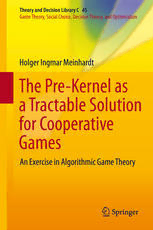
The Pre-Kernel as a Tractable Solution for Cooperative Games: An Exercise in Algorithmic Game Theory PDF
Preview The Pre-Kernel as a Tractable Solution for Cooperative Games: An Exercise in Algorithmic Game Theory
Theory and Decision Library C 45 Game Theory, Social Choice, Decision Theory, and Optimization Holger Ingmar Meinhardt The Pre-Kernel as a Tractable Solution for Cooperative Games An Exercise in Algorithmic Game Theory THEORYAND DECISIONLIBRARY C GameTheory,Social Choice, DecisionTheory,and Optimization Volume45 Editors-in-Chief HervéMoulin,Glasgow,Scotland,UnitedKingdom HansPeters,Maastricht,TheNetherlands HonoraryEditor StefH.Tijs,Tilburg,TheNetherlands EditorialBoard Jean-JacquesHerings,Maastricht,TheNetherlands MatthewO.Jackson,Stanford,CA,USA MamuroKaneko,Tokyo,Japan HansKeiding,Copenhagen,Denmark BezalelPeleg,Jerusalem,Israel ClemensPuppe,Karlsruhe,Germany AlvinE.Roth,Stanford,CA,USA DavidSchmeidler,TelAviv,Israel ReinhardSelten,Bonn,Germany WilliamThomson,Rochester,NJ,USA RakeshVohra,Evanston,IL,USA PeterWakker,Rotterdam,TheNetherlands Forfurthervolumes: http://www.springer.com/series/6618 Holger Ingmar Meinhardt The Pre-Kernel as a Tractable Solution for Cooperative Games An Exercise in Algorithmic Game Theory 123 HolgerIngmarMeinhardt InstituteofOperationsResearch KarlsruheInstituteofTechnology(KIT) Karlsruhe Germany ISSN0924-6126 ISSN2194-3044(electronic) ISBN978-3-642-39548-2 ISBN978-3-642-39549-9(eBook) DOI10.1007/978-3-642-39549-9 SpringerHeidelbergNewYorkDordrechtLondon LibraryofCongressControlNumber:2013950138 (cid:2)c Springer-VerlagBerlinHeidelberg2014 Thisworkissubjecttocopyright.AllrightsarereservedbythePublisher,whetherthewholeorpartof thematerialisconcerned,specificallytherightsoftranslation,reprinting,reuseofillustrations,recitation, broadcasting,reproductiononmicrofilmsorinanyotherphysicalway,andtransmissionorinformation storageandretrieval,electronicadaptation,computersoftware,orbysimilarordissimilarmethodology nowknownorhereafterdeveloped.Exemptedfromthislegalreservationarebriefexcerptsinconnection with reviews or scholarly analysis or material supplied specifically for the purpose of being entered and executed on a computer system, for exclusive use by the purchaser of the work. Duplication of this publication or parts thereof is permitted only under the provisions of the Copyright Law of the Publisher’slocation,initscurrentversion,andpermissionforusemustalwaysbeobtainedfromSpringer. PermissionsforusemaybeobtainedthroughRightsLinkattheCopyrightClearanceCenter.Violations areliabletoprosecutionundertherespectiveCopyrightLaw. Theuseofgeneraldescriptivenames,registerednames,trademarks,servicemarks,etc.inthispublication doesnotimply,evenintheabsenceofaspecificstatement,thatsuchnamesareexemptfromtherelevant protectivelawsandregulationsandthereforefreeforgeneraluse. While the advice and information in this book are believed to be true and accurate at the date of publication,neithertheauthorsnortheeditorsnorthepublishercanacceptanylegalresponsibilityfor anyerrorsoromissionsthatmaybemade.Thepublishermakesnowarranty,expressorimplied,with respecttothematerialcontainedherein. Printedonacid-freepaper SpringerispartofSpringerScience+BusinessMedia(www.springer.com) Foreword This monograph is devoted to the pre-kernel scheme as an attractive and fair solution concept which can be used alternatively to the Shapley value in order to divide the outcomes of mutual cooperation. The framework of the class of cooperativegames without transferable utility is used to analyze a process of fair division in accordance with the pre-kernel. Here convex analysis plays a central role,in particulartheoperationofFenchelconjugates.Pursuinga betterandmore comprehensiveunderstandingofafaircompromise,asetofprinciplesofdistributive justice is presented. On the one hand the axiomatic foundation of the Shapley value is given that lets one consider this solution scheme as a fair division rule. On the other handthe axiomaticfoundationof the pre-kernelis presentedto set a counterpointto that what subjects consider as fair or unfair. Besides its attractive axiomatic characterization,it is arguedthat an efficientand easy computabilityof a proposed solution is a desirable feature to qualify as a fair division rule. It is illustratedonthebasisofanexamplefromcooperativeoligopolygamethatthepre- kernelistechnicallymorecomplicatedandisthereforedifficulttocompute,aclear disadvantagewith regardtothe Shapleyvaluewhichpossessesa simple,efficient, andsystematiccomputationprocedure. Adualrepresentationmethod,basedonFenchelconjugation,givesrisetoafull characterizationofthepre-kernelintermsofconstrainedminimumsets,whichcan betreatedbyprojectionmethods.Thisapproachisbasedonthepioneeringworkof Martínez-Legaz(1996).Inthiscontextitisprovedthatunderaregimeoforthogonal projections,thesequenceofpayoffvectorsgeneratedbyeachoneoftheproposed computationmethodsiscycle-free. Inordertoevaluatetheperformanceoftheproposedalgorithms,someempirical resultsarediscussedandaresetincomparisontosomewell-knowncomputational methodsfromtheliterature. Most parts of the monograph are new and yet unpublished. The book is an undeniablereferenceforabetterunderstandingoftherelationshipbetweenthepre- kernelschemeandtheShapleyvalueconcept. Karlsruhe,Germany DiethardPallaschke March2013 v Preface This book provides an alternative approach to study the pre-kernel solution of transferable utility games based on a generalized conjugation theory from con- vex analysis. Although the pre-kernel solution possesses an appealing axiomatic foundation that lets one consider this solution concept as a standard of fairness withoutreferringto thenotionof“interpersonalcomparisonofutility” –ithas, in addition,afoundationthatisbasedonanoncooperativebargainingmodel–many scholars,nevertheless,regardthepre-kernelanditsrelatedsolutionsasobscureand too technically complex to be treated as a real alternative to the Shapley value. Comprehensibleandefficientcomputabilityiswidelyregardedasadesirablefeature to qualify a solution concept apart from its axiomatic foundationas a standard of fairness.Subjectswilldistrustadivisionrulethatcanonlybecomputedand“fully understood”by a handfulof experts. It remains the flavor of being fleeced by the proposerormediator.Incasethatdecisionmakershavethefeelingofbeingtreated unfairly,theywillobstructanagreement.Especiallyiftheyarenotabletocompute theirownsharebythemselves.Here,theShapleyvalue–ifitisacceptedasafair divisionrule–offerstheclearadvantagethateverybodycancalculatehisownshare simplybyapplyingitsformula. A central task in real-life managerial problems concerns the sustainability of the resource. Especially in areas where multilateral agreements are nonbinding, compliance becomes a crucial issue in order to avoid the destruction of a natural resource. Compliance can be achieved when agents exercise self-constraint and refrain from using their powers to exploit one another. Then a solution can be obtained that is acceptable for all participants: a fair compromise. Such a compromise will be considered a fair outcome when it produces a common virtual world where compliance is reality and obstruction is held to account. Rather than considering fairness as some opaque concept, in order to advance ourunderstandingofcomplianceon nonbindingagreements,we studyfairnesson the set of principles (axioms) which describe the pre-kernel. However, the pre- kernel is not fully understood to give a simple and efficient computation method to qualify as an attractive fair division rule. Other rules of distributive justice are usually considered more attractive for implementing fairness in economical or in vii viii Preface experimentalsituations,whichmight,however,haveoriginatedinitssimplicityof computationandnotonitsnormativelycompellingfoundation. In thismonograph,we reviewandthenimproveanapproachthatwasinvented byMeseguer-Artola(1997)tocomputethepre-kernelofacooperativegamebythe indirectfunction.TheindirectfunctionisknownastheFenchel-Moreauconjugation of the characteristic function introducedby Martínez-Legaz(1996).By following andextendingtheindirectfunctionapproachproposedbyMeseguer-Artola(1997), we are able to characterize the pre-kernel of the grand coalition simply by the solution sets of a family of quadratic objective functions.Now, each functioncan be solved by means well known from analysis and linear algebra. For economic situationswhichofferstrongincentiveformutualcooperation,theformerlydifficult issue of a fair divisionof the proceedsin accordancewith the pre-kernelcan now be easily accomplished and verified by partners involved in a common venture. Henceforth, the rules of distributive justice (axioms) which characterize the pre- kernelasafaircompromiseshallbedeemedasanalternativetosolveandstabilize theself-administrationproblemofanaturalresource.Formanysubjectsfairnessisa nebulousnotion.Subjectshavedifferentperceptionsofwhattheyconsidertobefair orunfair.Enlargingthesetofrulesfordistributivejusticethatcanbedevotedand agreeduponforself-managinganaturalresourcemighthelptoavoiditsdestruction. Karlsruhe,Germany HolgerIngmarMeinhardt March2013 Acknowledgements Iamgratefultoanumberofpeoplewhoofferedvaluablesuggestionsandremarks during the preparation of the monograph.Especially, I am very much indebted to Diethard Pallaschke for his careful mathematical proofreading and the advice he offeredduringdifferentstages of the monograph.I am also verythankfulto Axel Ostmann and Jean Derks for their helpful comments and constructive proposals of improvement to an earlier version of the manuscript. For their stimulating discussion, I want to express my gratitude to Chih Chang, Theo Driessen, Walter Kern, and Martha Saboyá Baquero. Furthermore, I want to thank my brother and sister-in-law, Bjoern and Lynnette Meinhardt, for their linguistic assistance. Of course,fortheerrorsthatremaininthiswork,theauthoracceptsfullresponsibility. In addition,I acknowledgethe kind and excellentsupportfrom the staff of the Steinbuch Center of Computation (SCC) at the Karlsruhe Institute of Technology (KIT)theyofferedduringthesoftwaredevelopmentanditsimplementation.Special thanks go pars pro toto to Horst Gernert, Hartmut Häfner, Elisabeth Syrjakow, RichardWalter,andPaulWeber. Thisbookiswarmlydedicatedtomyparents. ix
